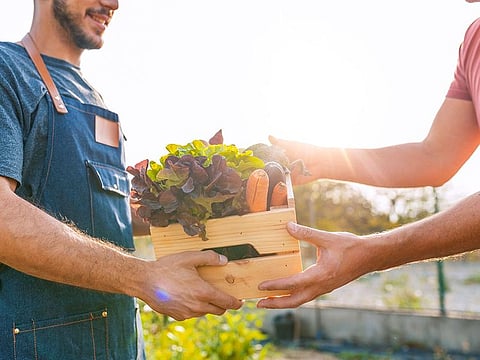Is COVID-19 blocking access to your neighbour's kitchen?
The pandemic may have reduced neighbourly treats, but readers say it is temporary

When Indian expat Husna Siddiqua got married in 2018 and settled down in Dubai with her husband, she didn’t know anyone in the city.
The homemaker said: “The first step for me was to make friends. I thought, in order to do that, I’d have to visit them. So, I decided to go to all the houses in the neighbourhood one by one.”
Every alternate day, she would prepare a sweet treat and knock on a neighbour’s door. “When we visit somebody for the first time in India, we take sweets for them,” she explained.
Her arsenal of recipes included gajar ka halwa (carrot-based pudding) and gond ke laddu (sweet made with dried fruits and nuts).
The neighbours welcomed the introduction, chatted with Siddiqua and exchanged contact numbers. Soon, they began to reciprocate with dishes of their own. Sending and receiving sweet and savoury treats became a regular occurrence.
Siddiqua said the exchanges created a sense of community among residents. “In today's era, when everyone is so busy in their lives, these small things help us to stay connected and create a bond.”
She even made panjiri – a nutritional snack made with whole-wheat flour, dried fruits, flax seeds, and herbal gums – for a new mother in the neighbourhood.
Siddiqua said: “We started meeting up and had a few parties. It kept going on like this for a long time, until COVID-19 hit us – hard.”
Now, it’s been a year since the neighbours met.
Siddiqua said she tried to keep in touch, but with restrictions in place, people were hesitant to interact at close range with those outside their households.
She said: “In the beginning, I took precautions while sending food to [my neighbours]. I used disposables and sanitized the boxes properly before giving it to them. But a few started objecting to the practice and said that we should refrain from sending food to each other… that’s when I stopped.”
Safety measures are paramount in a pandemic, and Pakistani expatriate Mevvish Aziz felt its effect when her social calendar suddenly cleared up.
The 35-year-old homemaker lives in Jubail, Saudi Arabia, and said iftar parties were a norm in her residential building during Ramadan. But when the pandemic occurred, the invitations ground to a halt.
She said: “I am blessed to have really friendly neighbours, who enjoy meeting each other. We used to get invited to iftars almost every other day, but because of COVID-19, everyone stopped doing that.”
Instead, her neighbours started sending iftars to everyone’s homes. Aziz said: “We received complete iftars for almost 15 to 20 days. It’s a lovely feeling when you don’t have to cook all the time.”
The community adhered to an unspoken rule of dropping off iftar at each other’s doorstep. Their contactless delivery concept ensured everyone was keeping safe, even as they enjoyed each other’s cooking.
For Tanisha Gupta, an advertising and public relations copywriter based in Dubai, the pandemic only helped improve relations with her neighbours.
The 34-year-old said: “Honestly, it feels like our bond became stronger, because for a while, no one saw anyone outside of their own house or building because of the lockdown. So, our neighbours were the most in-person (socially distanced) contact we had, outside of our own family members.”
When she had twins in 2017, Gupta moved into an apartment next to her parents in Bur Dubai. She said: “There is a lovely Pakistani family on the other side of my home – I've known them since 2011. Once we struck up a friendship, it became routine for my mum, our neighbour and me to exchange food, recipes, and surprise one another with whatever has been cooked for that day.”
Gupta said she frequently enjoys eating her mum’s butter chicken and her neighbours’ haleem.
However, they are all being careful during the pandemic, she said.
“We are taking precautions and the frequency of exchanging dishes has even reduced slightly, but it has not stopped entirely. I know it will definitely go back to normal whenever the situation improves!”
Until then, she said she is happy to be the neighbour “in the middle” of two households that frequently provide her with delicious fare – even in a pandemic.



